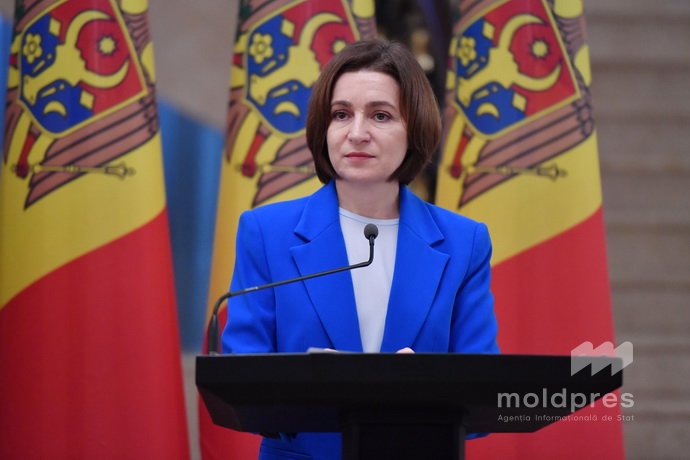
Moldovan president's message on 86th anniversary of signing Ribbentrop-Molotov Pact
President Maia Sandu sent a message today on the 86th anniversary of the signing of the Ribbentrop-Molotov Pact. The head of state stated that the lesson offered by this page of history 'is more relevant than ever — because we still see attempts to redraw borders by force, to subject people against their will'.
Maia Sandu mentioned that by signing the Ribbentrop-Molotov Pact, two totalitarian regimes decided to divide the world, ignoring the peoples' rights to freedom and dignity. As a result, 'millions of people were uprooted, sent to camps, or killed,' said the head of state.
'Today we mark 86 years since the signing of the Ribbentrop-Molotov Pact, through which two totalitarian regimes decided to divide the world, ignoring the peoples' rights to freedom and dignity. What followed, we all know: millions of people were uprooted, sent to camps, or killed. In our country, terrible tragedies occurred — our grandparents and great-grandparents suffered deportations, famine, fear and deprivation,' said Maia Sandu.
The head of state noted that 86 years after this event, 'we see politicians who want to divide us and drag us back into the darkness of dictatorship and fear, where we must never return.'
'This historical lesson is more relevant than ever because we still see attempts to redraw borders by force, to subject people against their will. We see politicians among us who want to divide us and pull us back into the darkness of dictatorship and fear, where we must never return,' emphasized the president.
The official said that it is necessary for the path of freedom, democracy, and peace to be irreversible because only then can we honor the memory of those who suffered.
'However, the Republic of Moldova and its citizens have chosen the path of freedom, democracy, and peace. We must ensure that this path is irreversible. Only in this way can we honor the memory of those who suffered and build a strong, free, and European country,' concluded the head of state.
The Ribbentrop-Molotov Pact, also known as the Stalin-Hitler Pact was signed in Moscow on August 23, 1939, by the head of government and foreign minister of the USSR, Vyacheslav Molotov, and German foreign minister Joachim von Ribbentrop, in the presence of Stalin. The document represented a non-aggression treaty between the Soviet Union and Nazi Germany. Based on this, the two parties divided between them the spheres of territorial influence in Europe.
Just nine days after the signing of the Ribbentrop-Molotov Pact, on September 1, 1939, German forces attacked Poland, triggering World War II.
PHOTO GALLERY // Moldova's leadership, ministers, MPs, diplomatic corps' representatives, citizens lay flowers at monument Grieving Mother, monument to Stephen the Great and Holy, on occasion of Independence Day
European Council President conveys message on Moldova's Independence Day
European MP says visit by European leaders to Chisinau confirms European path of Moldova
European Parliament President conveys message on Moldova's Independence Day
European Union High Representative conveys message on Moldova's Independence Day
European Commission President conveys message on Moldova's Independence Day
LIVE // Moldova's Independence Day: laying of flowers at monument to Stephen the Great and Holy
Message by European Commissioner for Enlargement on Independence Day of Republic of Moldova
VIDEO // EU conveys emotional message for Republic of Moldova
German Chancellor says war in Ukraine must end, but not at cost of Ukraine's surrender
German Chancellor says Russia daily tries to undermine Moldova's freedom, Germany stand shoulder to shoulder with Moldova
German Chancellor in Chisinau says doors of European Union open for Moldova, country wanted in EU
Polish PM says there will be no safe Europe, no safe Poland, no safe France, no safe Germany without independent, secure Moldova
Moldovan president, leaders of France, Germany, Poland have meeting
LIVE // Maia Sandu, Emmanuel Macron, Friedrich Merz, Donald Tusk hold news conference in Chisinau
Moldovan president says if Moldova cannot persuade Russia to withdraw its army, option is to pursue EU Membership in two steps - first right Bank, then left bank
LIVE // Emmanuel Macron, Friedrich Merz, Donald Tusk welcomed by President Maia Sandu at Presidency's headquarters
More individuals, including leader of Revival party, taken to police allegedly attempting to block motorcade of European officials expected in Chisinau
Head of State conveys message on Moldova's Independence Day
Congratulatory messages from around the world for Moldova; spokesman for government says Moldovans build real independence, European future day by day
President of Ukraine congratulates Republic of Moldova on Independence Day
Romanian PM conveys congratulations, firm support to Moldova on Independence Day
PM on Independence Day says independence unites Moldovans through wish to live in free country, through responsibility to build together future of peace, prosperity
Last day to register for Great National Dictation is August 27; Education Ministry announces prizes for top performers
Parliament speaker conveys message on 34th anniversary of Moldova's Independence


